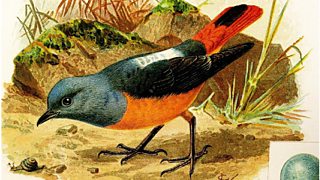Nine surprising facts about rain
Raindrops keep falling on our head over at Radio 3 this November – and we can't get enough of it. We're celebrating the wet stuff with a brand new work written by prize-winning nature poet Alice Oswald, plus the Rain Mixtape, the latest in our series of Breakfast mixes.
Rain isn't all bad. Next time you find yourself grumbling about a sudden shower, bear these surprising facts in mind...
1. The most effective way of staying dry in a downpour is to a) be thin and b) run fast
That’s probably not hugely helpful advice for some of us, but it is interesting.

In 2012, physicist Franco Bocci published research showing that both a person’s stature and the speed at which they move determines how soaked they’ll get in a rainstorm. After all, if you run to escape a downpour, you’ll probably get out of the rain sooner, but in the process you’ll run into more raindrops – especially if you have a big surface area. So what’s the best approach?
Bocci concluded that how wet you get ultimately depends on your height-to-breadth ratio, as well as wind direction and raindrop size. Assuming you’re thin (and straight up and down), there’s probably an optimal running speed that will ensure you stay as dry as possible.
Nevertheless, his general advice for anyone hoping to stay dry in a downpour remains to run. Run fast.
2. You may not have seen this coming, but some animals probably did
Many people swear blind that their pets know a storm is coming long before the forecasters do. Unfortunately, there’s not much in the way of scientific studies that would prove them right or wrong – but we do have explanations for why some animals appear to know when rain is coming.
Birds, for example, can act strangely before a storm – flying closer to the ground to avoid changes in air pressure. And fish, too, are said to become more animated when rain is on the approach – giving rise to the phrase: “Trout jump high when rain is nigh”.
It’s thought that impending rain creates changes in air chemistry which causes creatures living at the bottom of bodies of water to rise up, giving rise to a feeding frenzy among the fish population.
3. There is no record of it ever *actually* having rained cats and dogs
Although many animals ARE on record as having fallen from the skies – birds, fish and insects being the most common – cats and dogs aren’t among them. So why do we say it? This peculiar phrase has been used in English since the early 18th century, but its origins remain unclear. Several theories have been suggested, however, so you can take your pick.

An adaptation of the French word catadoupe (“waterfall”)? A reference to the torrential rain that would force cats and dogs out from under thatched roofs in the olden days? Or the kind of rain that could cause your pets to become ex-pets in a flood situation? You decide.
4. The rainiest place in the world is in India. By comparison, where you are probably isn't very rainy at all
The current title holder for wettest place on earth is Mawsynram, a village in north-eastern India that receives an incredible 11,871 mm of rain on average every year. To put that in perspective: Snowdonia in Wales receives average annual rainfull of just over 3,000 mm, while New York City gets a mere 1,174mm.
Meanwhile, the driest place on Earth is in Antarctica, in the aptly named McMurdo Dry Valleys. They haven’t seen seen a drop of rain for millions of years.
5. You'll be fine. The most rain ever to fall in a single day measured the height of a tall person
Next time you’re tempted to roll your eyes at the drizzle, remember that the town of Cilaos on the Indian Ocean island of Réunion was once hammered by a record 1,825mm of rain – just under six feet – over a 24-hour period during a tropical cyclone in 1952.
That’s the equivalent of 7,554 tonnes of rain per acre – or just over 5,000 hippos – all hitting the ground in the course of a single day.
6. How many words can you think of for rain? The Scots have over 100
That’s according to Scottish climate scientist and blogger Mike Haseler, who in 2014 set out to try and beat the Inuit’s much-talked of record on words for snow. Haseler tracked down an incredible 110 Scots phrases used to describe various types of rain and their consequences, of which he estimated he personally used around 50.
The list makes for fascinating reading. Why talk about boring old rain or drizzle when you could reference fiss, kaavie, daggling, haggering, sumps or pelsh?
7. That delicious smell you get after rainfall is called “petrichor”
The distinctive scent comes from a naturally-occuring plant oil that is absorbed by soil and rocks during dry periods. When rain falls, the oil is released into the air along with an organic compound called geosmin that's produced by the bacteria in wet soil.
It’s this combination that creates that clean, earthy, “just-rained smell”. Rain itself has no odour. Even acid rain looks and smells just like the normal kind.
8. There is a Cloud Appreciation Society, and you can join it right now
The UK’s Cloud Appreciation Society is an online home for the thousands of people around the world who like clouds and the things that come out of them. They sell a wide range of cloud-related merchandise and have even produced an entire CD of the sound of rainfall, which they reckon is “the most under-appreciated sound in the whole of nature”.
Rainfall is the most under-appreciated sound in the whole of nature
Tracks (which are listed by cloud type) include A Wild, Windy Afternoon and One Night, Under a Brolly.
9. Listening to rain online is a Thing
You may wince when you hear the pit-a-pat of precipitation, but the sound of rainfall is one of the most popular choices for people looking for ambient noise to work or relax to. A quick search for "rain noise" reveals dozens of noise generators, many of which allow users to listen to a continuously looping track of the sound of rainfall. Some even offer optional thunder.
Like white noise, many people find the sound soothing and use it at work and at home to block out aural distractions or to fall asleep. Give it a whirl.
Radio 3’s Rain Mixtape brings together the sound of rainfall with music inspired by the natural world in a seamless, relaxing mix. Stream or download it now from the Radio 3 Breakfast website.
-
![]()
The rain mixtape
Music inspired by the natural world mixed seamlessly with the sound of rainfall.
-
![]()
The composer who took a cue from birdsong
Meet Olivier Messiaen, composer and avid birder.
-
![]()
Duet with a nightingale
Folk musician Sam Lee ventures into the forest for a special performance.
-
![]()
Breakfast on 3
Welcome to the home of birdsong on Radio 3




